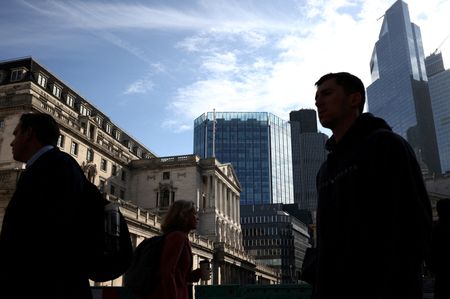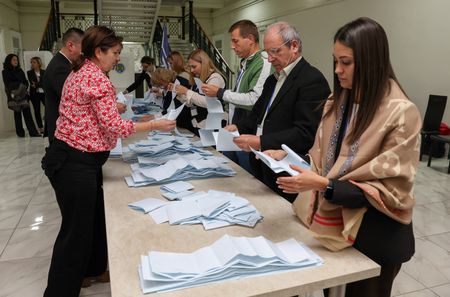By Suban Abdulla
LONDON (Reuters) -Britain’s labour market is showing more signs of cooling and businesses remain negative about their prospects in the coming months, according to surveys published on Monday.
Job search website Adzuna said online job adverts fell by 1.3% in the 12 months to August – the first such drop since February – and by 2.1% in month-on-month terms.
However, vacancies remained higher than in January, typically a peak hiring month, which suggested the jobs market is “cooling, not collapsing,” Adzuna said.
Advertised salaries rose 0.2% in monthly terms in August to 42,367 pounds ($56,589.60), and by 8.9% from a year earlier, underscoring the dilemma facing the Bank of England which is worried about a hiring slowdown but also inflation pressures.
“Salary growth remains one of the few constants, still outpacing inflation, but hiring appetite is uneven and increasingly shaped by a mix of sector-specific swings and the growing role of AI within the UK labour market,” Andrew Hunter, co-founder of Adzuna, said.
The BoE held interest rates this month and investors are fully pricing only one 25 basis-point reduction in borrowing costs by the end of 2026 as the central bank worries about inflation pressures from the jobs market.
Employers have reduced their hiring after an increase in April in their social security contributions, announced in finance minister Rachel Reeves’ first budget last October, and a rise in the minimum wage.
Businesses are concerned about further tax rises in Reeves’ next fiscal statement on November 26.
Official data published earlier this month showed vacancies rose in the three months to August and wage growth cooled slightly in the May-to-July period.
A survey published on Monday by the Confederation of British Industry showed British companies expect a drop in activity over the coming three months, partly reflecting the impact of the higher social security contributions for employers.
The CBI said expectations measures in its surveys of manufacturers, retailers and other services industries fell to -20 for the three months to December. The CBI’s gauge of business activity was -32 in the three months to September.
“A persistent climate of global economic uncertainty is further hampering decision-making,” CBI chief deputy economist Alpesh Paleja said.
“This is now accompanied by renewed nervousness around the November budget, with businesses concerned about being asked to again shoulder the burden of fixing the public finances.”
($1 = 0.7487 pounds)
(Reporting by Suban AbdullaEditing by William Schomberg)











